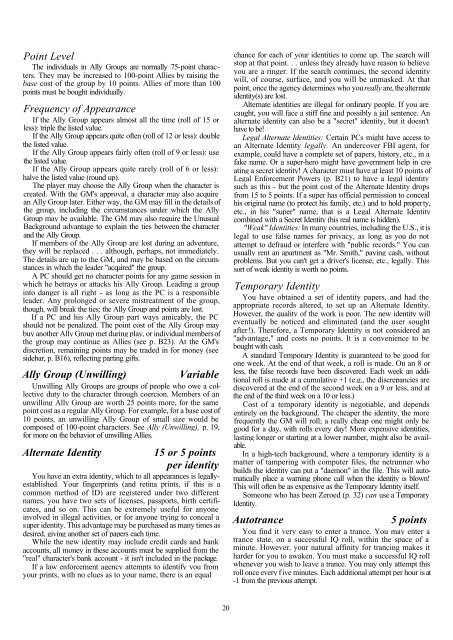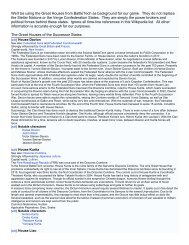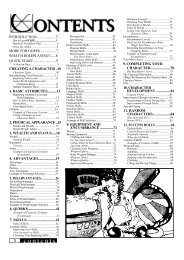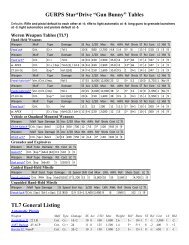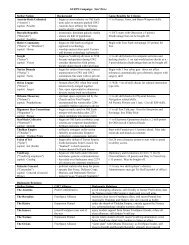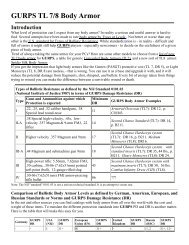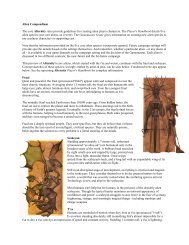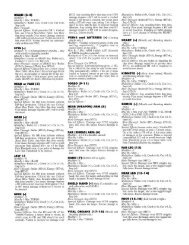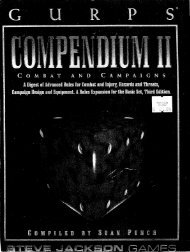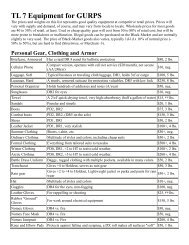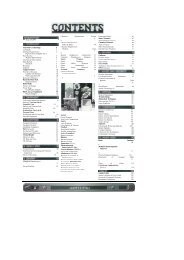GURPS - Compendium 1..
GURPS - Compendium 1..
GURPS - Compendium 1..
You also want an ePaper? Increase the reach of your titles
YUMPU automatically turns print PDFs into web optimized ePapers that Google loves.
Point Level<br />
The individuals in Ally Groups are normally 75-point characters.<br />
They may be increased to 100-point Allies by raising the<br />
base cost of the group by 10 points. Allies of more than 100<br />
points must be bought individually.<br />
Frequency of Appearance<br />
If the Ally Group appears almost all the time (roll of 15 or<br />
less): triple the listed value.<br />
If the Ally Group appears quite often (roll of 12 or less): double<br />
the listed value.<br />
If the Ally Group appears fairly often (roll of 9 or less): use<br />
the listed value.<br />
If the Ally Group appears quite rarely (roll of 6 or less):<br />
halve the listed value (round up).<br />
The player may choose the Ally Group when the character is<br />
created. With the GM's approval, a character may also acquire<br />
an Ally Group later. Either way, the GM may fill in the details of<br />
the group, including the circumstances under which the Ally<br />
Group may be available. The GM may also require the Unusual<br />
Background advantage to explain the ties between the character<br />
and the Ally Group.<br />
If members of the Ally Group are lost during an adventure,<br />
they will be replaced . . . although, perhaps, not immediately.<br />
The details are up to the GM, and may be based on the circumstances<br />
in which the leader "acquired" the group.<br />
A PC should get no character points for any game session in<br />
which he betrays or attacks his Ally Group. Leading a group<br />
into danger is all right - as long as the PC is a responsible<br />
leader. Any prolonged or severe mistreatment of the group,<br />
though, will break the ties; the Ally Group and points are lost.<br />
If a PC and his Ally Group part ways amicably, the PC<br />
should not be penalized. The point cost of the Ally Group may<br />
buy another Ally Group met during play, or individual members of<br />
the group may continue as Allies (see p. B23). At the GM's<br />
discretion, remaining points may be traded in for money (see<br />
sidebar, p. B16), reflecting parting gifts.<br />
Ally Group (Unwilling)<br />
Variable<br />
Unwilling Ally Groups are groups of people who owe a collective<br />
duty to the character through coercion. Members of an<br />
unwilling Ally Group are worth 25 points more, for the same<br />
point cost as a regular Ally Group. For example, for a base cost of<br />
10 points, an unwilling Ally Group of small size would be<br />
composed of 100-point characters. See Ally (Unwilling), p. 19,<br />
for more on the behavior of unwilling Allies.<br />
Alternate Identity 15 or 5 points<br />
per identity<br />
You have an extra identity, which to all appearances is legallyestablished.<br />
Your fingerprints (and retina prints, if this is a<br />
common method of ID) are registered under two different<br />
names, you have two sets of licenses, passports, birth certificates,<br />
and so on. This can be extremely useful for anyone<br />
involved in illegal activities, or for anyone trying to conceal a<br />
super identity. This advantage may be purchased as many times as<br />
desired, giving another set of papers each time.<br />
While the new identity may include credit cards and bank<br />
accounts, all money in these accounts must be supplied from the<br />
"real" character's bank account - it isn't included in the package.<br />
If a law enforcement agency attempts to identify you from<br />
your prints, with no clues as to your name, there is an equal<br />
chance for each of your identities to come up. The search will<br />
stop at that point. . . unless they already have reason to believe<br />
you are a ringer. If the search continues, the second identity<br />
will, of course, surface, and you will be unmasked. At that<br />
point, once the agency determines who you really are, the alternate<br />
identity(s) are lost.<br />
Alternate identities are illegal for ordinary people. If you are<br />
caught, you will face a stiff fine and possibly a jail sentence. An<br />
alternate identity can also be a "secret" identity, but it doesn't<br />
have to be!<br />
Legal Alternate Identities: Certain PCs might have access to<br />
an Alternate Identity legally. An undercover FBI agent, for<br />
example, could have a complete set of papers, history, etc., in a<br />
fake name. Or a super-hero might have government help in creating<br />
a secret identity! A character must have at least 10 points of<br />
Legal Enforcement Powers (p. B21) to have a legal identity<br />
such as this - but the point cost of the Alternate Identity drops<br />
from 15 to 5 points. If a super has official permission to conceal<br />
his original name (to protect his family, etc.) and to hold property,<br />
etc., in his "super" name, that is a Legal Alternate Identity<br />
combined with a Secret Identity (his real name is hidden).<br />
"Weak" Identities: In many countries, including the U.S., it is<br />
legal to use false names for privacy, as long as you do not<br />
attempt to defraud or interfere with "public records." You can<br />
usually rent an apartment as "Mr. Smith," paying cash, without<br />
problems. But you can't get a driver's license, etc., legally. This<br />
sort of weak identity is worth no points.<br />
Temporary Identity<br />
You have obtained a set of identity papers, and had the<br />
appropriate records altered, to set up an Alternate Identity.<br />
However, the quality of the work is poor. The new identity will<br />
eventually be noticed and eliminated (and the user sought<br />
after!). Therefore, a Temporary Identity is not considered an<br />
"advantage," and costs no points. It is a convenience to be<br />
bought with cash.<br />
A standard Temporary Identity is guaranteed to be good for<br />
one week. At the end of that week, a roll is made. On an 8 or<br />
less, the false records have been discovered. Each week an additional<br />
roll is made at a cumulative +1 (e.g., the discrepancies are<br />
discovered at the end of the second week on a 9 or less, and at<br />
the end of the third week on a 10 or less.)<br />
Cost of a temporary identity is negotiable, and depends<br />
entirely on the background. The cheaper the identity, the more<br />
frequently the GM will roll; a really cheap one might only be<br />
good for a day, with rolls every day! More expensive identities,<br />
lasting longer or starting at a lower number, might also be available.<br />
In a high-tech background, where a temporary identity is a<br />
matter of tampering with computer files, the netrunner who<br />
builds the identity can put a "daemon" in the file. This will automatically<br />
place a warning phone call when the identity is blown!<br />
This will often be as expensive as the Temporary Identity itself.<br />
Someone who has been Zeroed (p. 32) can use a Temporary<br />
Identity.<br />
Autotrance<br />
5 points<br />
You find it very easy to enter a trance. You may enter a<br />
trance state, on a successful IQ roll, within the space of a<br />
minute. However, your natural affinity for trancing makes it<br />
harder for you to awaken. You must make a successful IQ roll<br />
whenever you wish to leave a trance. You may only attempt this<br />
roll once every f ive minutes. Each additional attempt per hour is at<br />
-1 from the previous attempt.<br />
20


